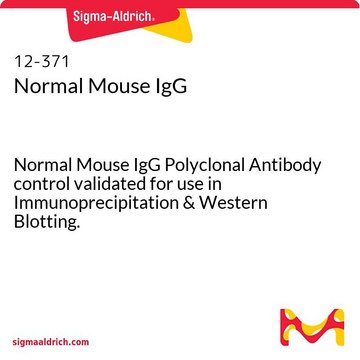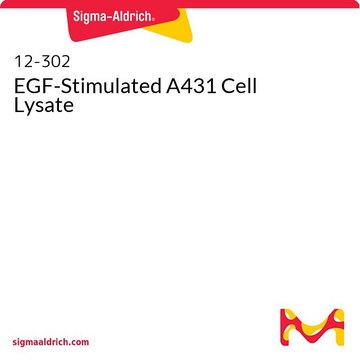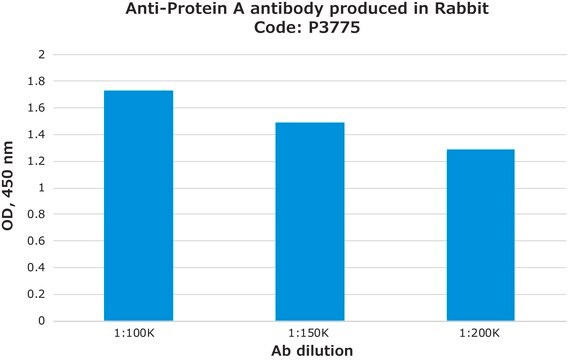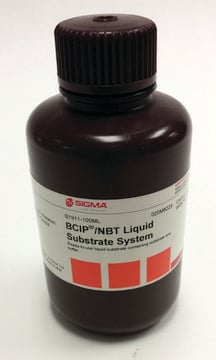AP308A
Goat Anti-Mouse IgG Antibody, (H+L) Alkaline Phosphatase conjugate
1 mg/mL, Chemicon®
Sign Into View Organizational & Contract Pricing
All Photos(1)
About This Item
UNSPSC Code:
12352203
eCl@ss:
32160702
NACRES:
NA.46
Recommended Products
biological source
goat
Quality Level
conjugate
alkaline phosphatase conjugate
antibody form
affinity purified immunoglobulin
antibody product type
secondary antibodies
clone
polyclonal
species reactivity
mouse
manufacturer/tradename
Chemicon®
concentration
1 mg/mL
technique(s)
ELISA: suitable
western blot: suitable
shipped in
wet ice
target post-translational modification
unmodified
Related Categories
General description
Immunoglobulin G (IgG), is one of the most abundant proteins in human serum with normal levels between 8-17 mg/mL in adult blood. IgG is important for our defence against microorganisms and the molecules are produced by B lymphocytes as a part of our adaptive immune response. The IgG molecule has two separate functions; to bind to the pathogen that elicited the response and to recruit other cells and molecules to destroy the antigen. The variability of the IgG pool is generated by somatic recombination and the number of specificities in an individual at a given time point is estimated to be 1011 variants.
The reagent is an affinity purified antibody from goat. The purified antibody is conjugated to alkaline phosphatase and stabilized in buffer.
Specificity
Specific for mouse IgG, heavy and light chain. The cross-reactivities of anti-mouse IgG antibody are tested in an ELISA. Minimum cross-reactivity to human IgG.
Application
ELISA: 1:3,000 (1,2)
Immunohistochemistry/immunocytochemistry: 1:200-1:500 (3,4)
Western Blot, chromogenic: 1:200- 1:500 (1,2)
Western Blot, chemiluminescent: 1:2,000-1:5,000 (1)
Optimal working dilutions must be determined by the end user.
Immunohistochemistry/immunocytochemistry: 1:200-1:500 (3,4)
Western Blot, chromogenic: 1:200- 1:500 (1,2)
Western Blot, chemiluminescent: 1:2,000-1:5,000 (1)
Optimal working dilutions must be determined by the end user.
Research Category
Secondary & Control Antibodies
Secondary & Control Antibodies
Research Sub Category
Whole Immunoglobulin Secondary Antibodies
Whole Immunoglobulin Secondary Antibodies
This Goat anti-Mouse IgG Antibody, (H+L) Alkaline Phosphatase conjugate is validated for use in ELISA, WB for the detection of Mouse IgG.
Physical form
ImmunoAffinity Purified
Storage and Stability
The undiluted antibody is stable at 2-80C for 12 months. Do not store in a diluted format. DO NOT FREEZE.
Legal Information
CHEMICON is a registered trademark of Merck KGaA, Darmstadt, Germany
Disclaimer
Unless otherwise stated in our catalog or other company documentation accompanying the product(s), our products are intended for research use only and are not to be used for any other purpose, which includes but is not limited to, unauthorized commercial uses, in vitro diagnostic uses, ex vivo or in vivo therapeutic uses or any type of consumption or application to humans or animals.
Not finding the right product?
Try our Product Selector Tool.
Storage Class Code
12 - Non Combustible Liquids
WGK
WGK 2
Flash Point(F)
Not applicable
Flash Point(C)
Not applicable
Certificates of Analysis (COA)
Search for Certificates of Analysis (COA) by entering the products Lot/Batch Number. Lot and Batch Numbers can be found on a product’s label following the words ‘Lot’ or ‘Batch’.
Already Own This Product?
Find documentation for the products that you have recently purchased in the Document Library.
Transcriptional regulation of livin by beta-catenin/TCF signaling in human lung cancer cell lines.
Dong Yuan,Liqun Liu,Dayong Gu
Molecular and Cellular Biochemistry null
Amber Haynes Fradkin et al.
Journal of pharmaceutical sciences, 98(9), 3247-3264 (2009-07-02)
Aggregation of recombinant therapeutic protein products is a concern due to their potential to induce immune responses. We examined the immunogenicity of protein aggregates in commercial formulations of recombinant human growth hormone produced by freeze-thawing or agitation, two stresses commonly
Ayse Inhan Garip et al.
Acta biologica Hungarica, 61(2), 158-167 (2010-06-04)
It is by now accepted that extremely low frequency electromagnetic fields ELF-EMF (0-300 Hz) affect biological systems although the mechanism has not been elucidated yet. In this study the effect of ELFEMF on the number of apoptotic cells of K562
Our team of scientists has experience in all areas of research including Life Science, Material Science, Chemical Synthesis, Chromatography, Analytical and many others.
Contact Technical Service








